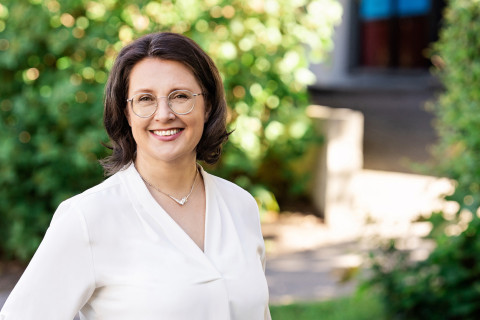Professor of Logopedics Marja Laasonen is one of the key people whose arrival in Joensuu – and Eastern Finland – has been awaited for years.
- Text Nina Venhe | Photo Anna Dammert
Multidisciplinary logopedics gets off to a good start in Eastern Finland
Together with her colleagues, the university’s recently appointed Professor of Logopedics Marja Laasonen is launching the long-awaited degree programme in logopedics at the University of Eastern Finland. Starting next autumn, the programme will alleviate the shortage of speech-language therapists in Eastern Finland.
“Everything is already planned and prepared for the autumn – the only thing missing are the students.”
Logopedics is very popular: in the first year, more than 800 people applied for admission to logopedics at UEF in the joint application system, and 25 of them will eventually be admitted.
“I’m positive about and look forward to the autumn. We have very good resources, great study facilities and a ready-made hybrid model for studying. There are also plans to build a simulation facility and a research laboratory where students can practice clinical work and conduct scientific research.”
An open house event is also planned for the autumn, taking place on 8 October. On that day, people interested in the facilities, education, and research in logopedics will have an opportunity to visit the Joensuu Campus and learn about the new programme.
“We are an enthusiastic and highly competent group of people, so it is great to present everything we have!”
Avoiding tunnel vision
Laasonen’s background is in psychology: she is a licensed psychologist and a special psychologist in neuropsychology. She has experience both in working with patients as well as in research and teaching.
“The focus of my patient work has been on neuropsychology and I have worked especially with children with developmental language disorders. Logopedics deals with many of the same issues and, since my own research interests are largely related to language challenges, I have felt closer to logopedics than neuropsychology in recent years.”
Before joining the University of Eastern Finland, Laasonen worked at the University of Helsinki and at the University of Turku, also as a professor in logopedics.
“Logopedics is an exceptionally multidisciplinary field. In addition to linguistics, it is closely related to psychology and neuroscience, for example. I have always been fascinated by discovering new things and finding novel opportunities for collaboration at the interface of different disciplines, and my own interests have always been very broad.”
Thus, it is only logical that Laasonen now works in a multidisciplinary environment where she can constantly interact with experts from different fields.
“Different perspectives and collaboration between experts from different fields bring research and its achievements to a completely different qualitative level than if we were just working within one discipline.”
Already as a university student, Laasonen was interested in many things and took courses in different fields in order to “avoid tunnel vision”, as she puts it.
“I have ended up studying many subjects simply because they have seemed super interesting. I didn’t think about how essential they were at the time, but they have often proved useful in later life.”
This was the case with pedagogical studies for teachers, among other things. Laasonen also decided to study teaching, even though there was no particular need for those skills at the time.
“But that skillset has been extremely useful in my work as a teacher and when developing curricula for study programmes.”
Stronger role in research
Many laypeople still believe that logopedics mostly deals with correcting the pronunciation of r and s sounds, for example. In reality, however, the field of logopedics is very broad and keeps on expanding.
“In addition to speech and language challenges, the field of logopedics encompasses the challenges of communication and swallowing in general. Speech-language therapists participate, for example, in the rehabilitation of people with autism spectrum disorders, brain injury, and memory disorders.”
Laasonen’s own research focuses on the challenges of language development and language learning, as well as on reading disabilities.
“It is great that I can continue my multidisciplinary research also at the University of Eastern Finland – multidisciplinarity seems to be almost like a default setting here!”
Education in logopedics is offered on Master’s level only in a few countries, and Laasonen believes that Finland should take a stronger role as a global leader in the field, especially in research.
Roots in Eastern Finland
Laasonen lives in Espoo and currently has no plans to move to Eastern Finland, although she will be visiting the campus cities when her work so requires.
“I’ve always thought of North Karelia as a region that I’m not very familiar with until, to my surprise, I learned that my father’s father is from Hammaslahti, Joensuu! There seems to be a great number of Laasonens living in Joensuu, so next I’ll be doing a bit of genealogy to see if I’ll find more relatives.”
MARJA LAASONEN
Professor of Logopedics, University of Eastern Finland ,1 June 2021 –
Born in 1972 in Helsinki
Specialist Psychologist of Neuropsychology, University of Helsinki, 2012
Title of Docent in Neuropsychology, University of Helsinki, 2009
Doctor of Psychology, University of Helsinki, 2002
Key roles:
Professor, Logopedics, University of Turku 2018–2020
Professor, Psychology, University of Turku 2016–2020
University Lecturer, University of Helsinki, 2015–2021
Academy of Finland Postdoctoral Researcher, University of Helsinki, 2005–2011
Neuropsychologist, Helsinki University Hospital, 2003 –2021
Doctoral Researcher, University of Helsinki, 1998–2001

